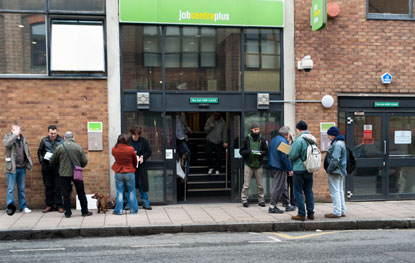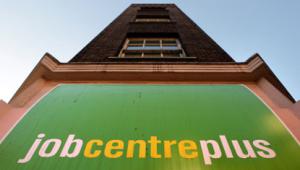By Richard Johnstone | 12 October 2011
Unemployment in the UK has hit a 17-year high, with more than 2.5 million people now out of work, the Office for National Statistics has revealed today. The total number
of unemployed people increased by 114,000 to 2.57 million in the three months
between June and August, representing 8.1% of the workforce, the ONS reported.
The total number
of unemployed people increased by 114,000 to 2.57 million in the three months
between June and August, representing 8.1% of the workforce, the ONS reported.According to the International Labour Organisation measure, this is the highest number of jobless people since 1994. The rise in the quarter was also steeper than the 50,000 increase reported in the previous three-month March to May period.
Youth unemployment has hit the highest level recorded since figures started to be kept in 1992, according to the ONS.
The government blamed the slowdown in the world economy. Employment minister Chris Grayling said: ‘It is clear that we are seeing the effect of the international economic crisis on the UK labour market.’
He said that the government was working to support growth and create jobs, including last week’s announcement that the government would increase council tenants’ right-to-buy discounts in a bid to boost house building.
However, public sector union Unison said that the rise in unemployment showed that the government should ‘act quickly to get our recovery on track’.
General secretary Dave Prentis said: ‘Here is yet more proof that this government’s policies are wrong for the economy. Our recovery is not even off the starting blocks, and the toll of job losses keeps on mounting.’
He called for the government to introduce a tax on financial transactions, and use the money to stimulate growth.
The ONS reports that unemployment has hit 991,000 for those aged between 16 and 24, a rise of 74,000 over the previous three months. But the total includes 269,000 people in full-time education.
The CBI said that the figures made ‘grim reading’. Chief policy director Katja Hall said: ‘The continuing rise in youth unemployment is a grave concern for us all. With jobs falling in the public sector, it’s vital the government does everything it can to support businesses to grow and create jobs, and help young people to get into work.’
The Commission on Youth Unemployment, set up in August by the Association of Chief Executives of Voluntary Organisations, said the figures represented a ‘wake-up call’. Commission chair David Miliband, the former Labour foreign secretary and leadership contender, said that the jobless totals represented ‘a challenge to the whole country’.
He said: ‘Youth unemployment scars people for life, particularly if it is prolonged, and at today's levels it will be costing the country millions of pounds a week.
‘Our aim is to understand the problems we face, arrive at the right solutions, and then act. We must not let the scourge of unemployment leave a permanent mark on the hundreds of thousands of young people living through it today.’
Acevo said that more than 100 charities, local councils, businesses and others worried about youth unemployment levels have submitted evidence to the commission. It will make policy recommendations when it reports this winter.





















